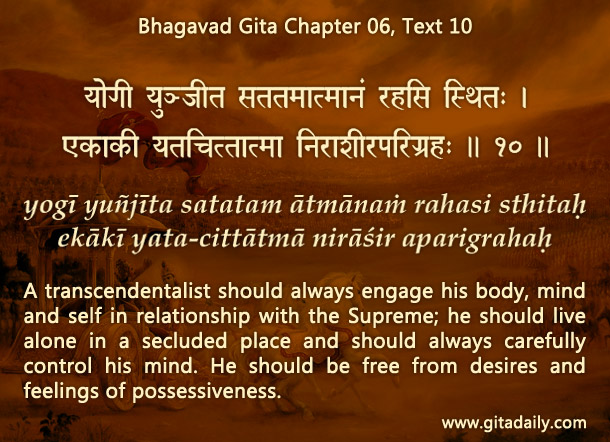Social isolation can be an opportunity to realize how we all are spiritually connected
Suppose a pandemic compels us to adopt social distancing. Instead of feeling lonely, we can repurpose that isolation for spiritual growth. In fact, that’s what yogic seekers do.
The Bhagavad-gita describes how aspiring yogis retreat to a secluded place (06.10). They choose seclusion to avoid the germs of sensuality that infect human society. Significantly, yoga practice culminates not in solitary meditation, but in the realization of spiritual connectedness. The topmost yogis perceive the commonality of all living beings — we all are essentially similar in our joys and sorrows; we all are spiritually connected (06.32).
During life’s normal course, we often see people with a utilitarian view: how can they fulfill our desires? Even if we hang out with them, our connections remain superficial and self-centered. In contrast, when we grow spiritually, our vision becomes increasingly free from utilitarianism. Being thus freed, we can see people in terms of their intrinsic value as parts of the divine, not just in terms of their extrinsic value of what they can do for us.
With such a spiritual vision, when we confront a social catastrophe, we appreciate that we all are sailing in the same boat. Despite our differences in gender, education, wealth, nationality or race, we all have bodies prone to destruction. And we all are at our core indestructible souls; we have the potential for incredible spiritual resilience that can empower us to weather life’s biggest storms. If we manifest a spark of that resilience, that spark can inspire many others to manifest their resilience too, thereby helping all of us to grow through adversities.
By thus re-envisioning social isolation as a spiritual opportunity, not merely a circumstantial necessity, we can go through that isolation purposefully and productively.
Think it over:
- Why do yogis choose social isolation?
- How does yoga practice reveal our spiritual connectedness?
- Whenever you are socially isolated, what can you do to realize that we all are spiritually connected?
***
06.10: A transcendentalist should always engage his body, mind and self in relationship with the Supreme; he should live alone in a secluded place and should always carefully control his mind. He should be free from desires and feelings of possessiveness.
To know more about this verse, please click on the image
Explanation of article:
Podcast:


Leave A Comment